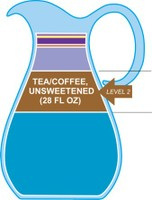Level 2: Tea, Coffee, Unsweetened

Black, Green, and Oolong Tea
These teas are the three main varieties consumed in the world.
Tea provides a variety of flavonoids and antioxidants as well as a few micronutrients, particularly fluoride. While there is solid evidence that tea protects against chemically induced cancers in experimental animals, it remains unclear whether tea consumption lowers cancer risk in humans. Tea also provides some amino acids, primarily theanine. Recently, theanine was shown to enhance innate immunity — the body’s ability to resist infections — by stimulating gamma-delta T cells; this effect has been replicated with regular (5 to 6 cups/day) tea consumption in humans. Tea consumption may also increase bone density, reduce tooth decay and cavities, and reduce kidney stones.
The Panel recommends 0 to 40 fluid ounces of unsweetened tea daily. Caffeine is the limiting factor.
Coffee
Several prospective cohort studies have observed significant inverse associations between regular coffee consumption and the risk of type 2 diabetes. High intakes of coffee have been associated with significant reductions in colorectal cancer risk in numerous case-control studies, but prospective cohort studies have not generally observed such significant associations. Coffee and caffeine consumption have been consistently associated with significant reductions in the risk of Parkinson’s disease in men but not women, which may be due to the modifying effects of estrogen. Unfiltered coffee should not be consumed — that is coffee directly boiled.
The Panel recommends coffee (unsweetened) up to 400 mg or about 32 fluid ounces daily. Caffeine is the limiting factor.
Caffeine Intake
There are greater amounts of caffeine in coffee than tea. At this time, in healthy adults the preponderance of evidence suggests that moderate caffeine intake up to 400 mg/day is not associated with increased risk of heart disease, hypertension, osteoporosis, or high cholesterol. Some people are more sensitive than others to caffeine’s effects and may feel effects at lower doses. Pregnancy and aging may affect one’s sensitivity to caffeine. Pregnant women are often advised to limit caffeine consumption because caffeine intakes higher than 300 mg/day have been associated with increased risk of miscarriage and low birth weight. Interestingly, a variety of investigations report an “inverted U” relation when a physiological or psychological response was plotted versus caffeine intake in a graph. That is, the magnitude of caffeine’s effect was smaller at low and high levels but greater at intermediate levels. This relationship has been reported for the effects of caffeine on exercise performance time, reaction time, vigilance, information processing, and mood state.
Calories and Caffeine Content of Teas and Coffees
| Calories* | Caffeine (mg)** | |
| Tea | ||
| Brewed Black Tea | 0 | 71 |
| Decaf Brewed Black Teas | 0 | 4 |
| Brewed Green Teas | 0 | 45 |
| Decaf Brewed Green Teas | 0 | 5 |
| Coffee | ||
| Lipton Original (Unsweetened) | 0 | 53 |
| Coffee Brewed | 3 | 143 |
| Coffee Brewed Espresso | 1.5 | 96 |
| Decaf Coffee Brewed | 0 | 4 |
| *Amount per 12 oz. (354.882ml) serving **Amount per 12 fl. oz. (335ml) serving |

